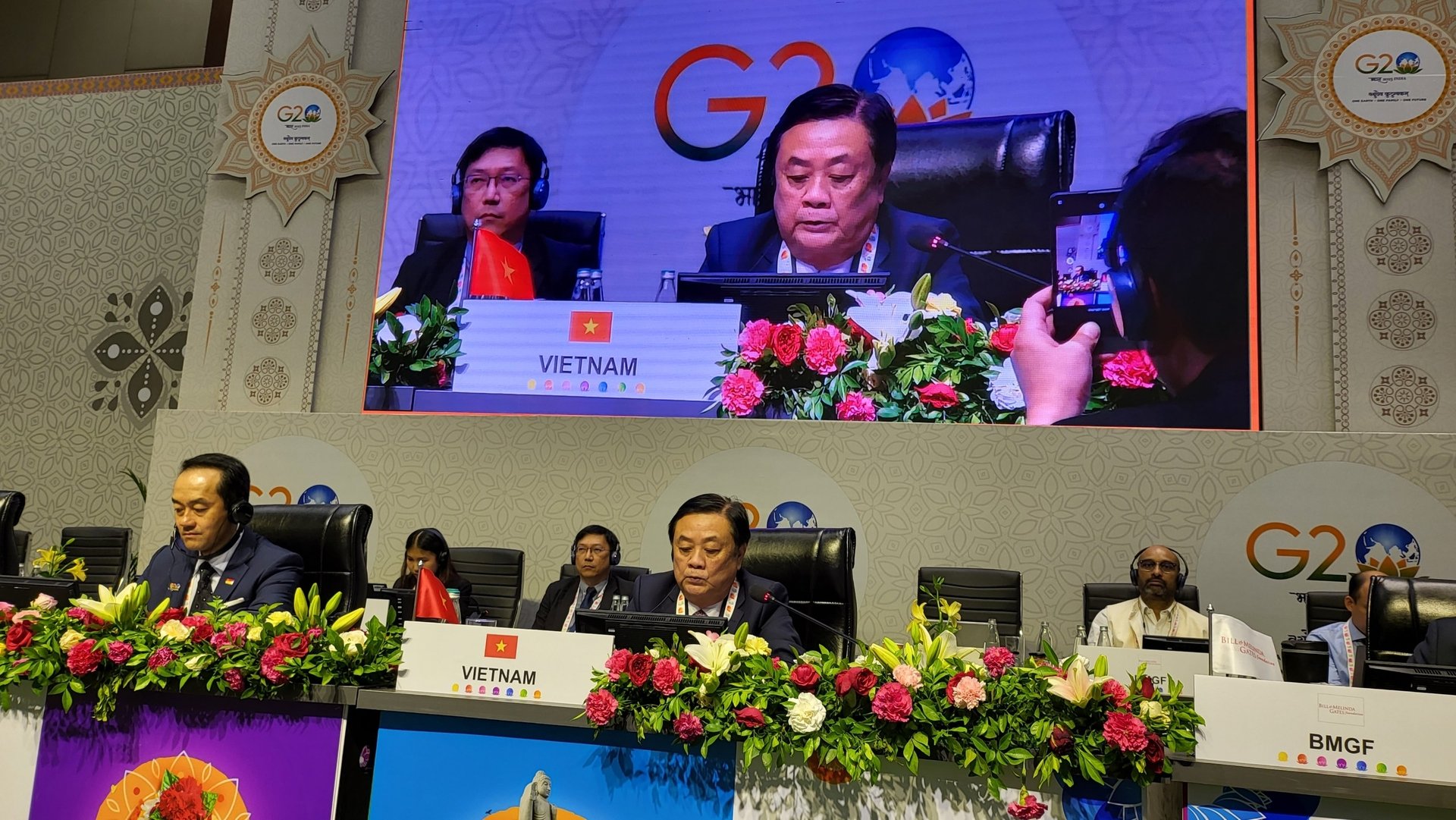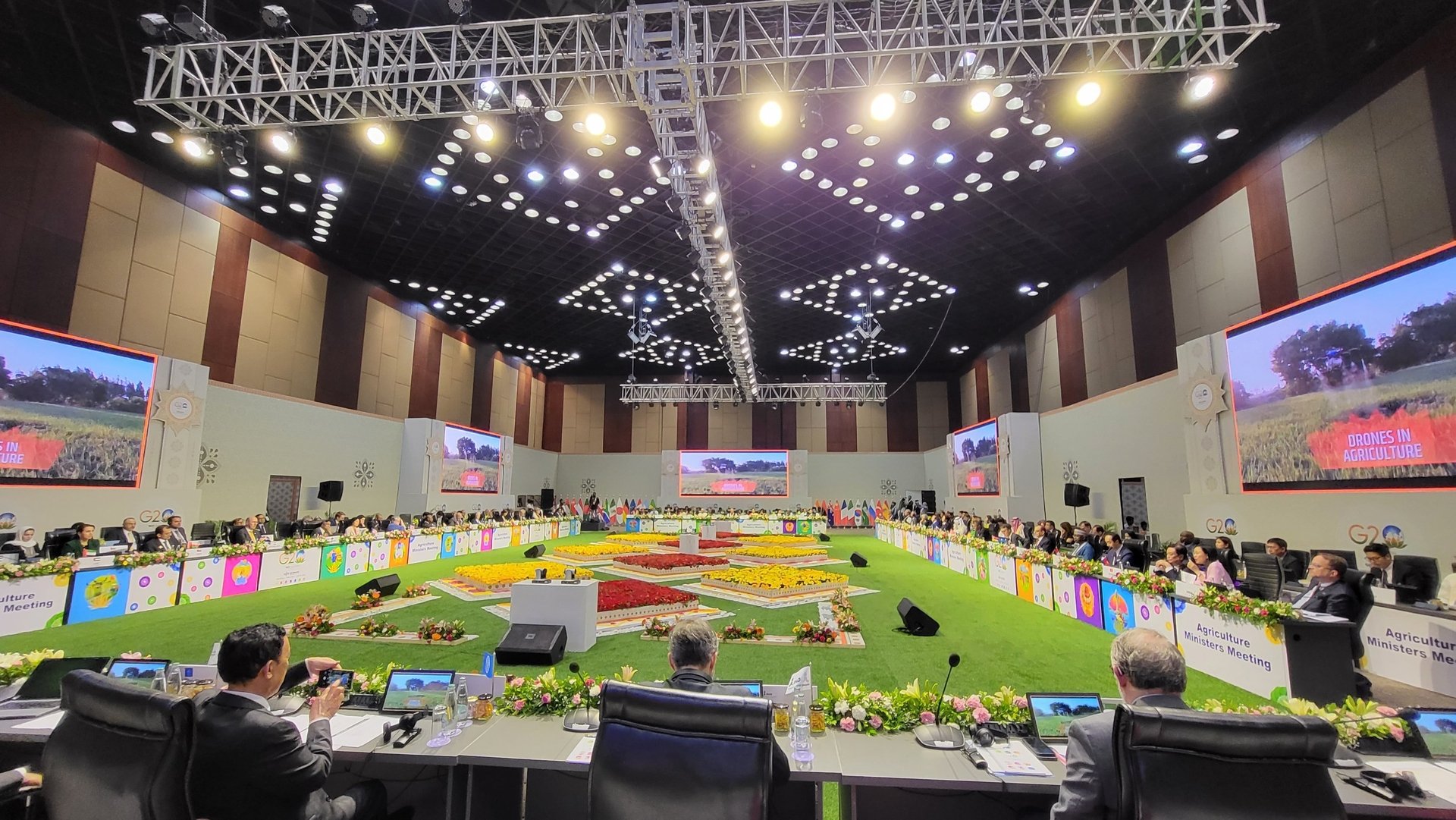May 24, 2025 | 16:22 GMT +7
May 24, 2025 | 16:22 GMT +7
Hotline: 0913.378.918
May 24, 2025 | 16:22 GMT +7
Hotline: 0913.378.918

Minister Le Minh Hoan speaks at the G20 Agriculture Ministerial Meeting.
The meeting was one of a series of leading significant events held by India, which captured the theme of its G20 presidency (December 1, 2022, to November 30, 2023): One Earth, One Family, One Future.
This year's conference emphasizes on food security and nutrition, climate-smart agriculture, inclusive agriculture value chains and food systems, and digitalization for agricultural transformation.
In addition to the member states, Bangladesh, Egypt, Mauritius, the Netherlands, Nigeria, Oman, Singapore, Spain, the United Arab Emirates, and Vietnam were invited. Ten international organizations participated in the G20 meeting. The Indian Government invited Vietnam as a special visitor to the meeting. This demonstrates the significance India placed on agricultural cooperation with Vietnam.
In his opening remarks at the meeting, Indian Prime Minister Narendra Mody emphasized the importance of agriculture, vouched for the adoption of healthier agricultural practices for improved soil health, crop health, and yield, as well as batting for larger adoption of traditional methods from different parts of the world. Modi stated that there is an immediate need to reduce agricultural and food waste and invest in the generation of wealth from waste. Modi said there is an urgent need to reduce agricultural and food waste and invest in creating wealth from waste.
“Globally, agriculture provides livelihood for over two point five billion people. In the Global South, agriculture accounts for almost 30% of GDP, and over 60% of jobs. And today, this sector faces several challenges. The supply chain disruptions caused by the pandemic have been worsened by the impact of geo-political tensions,” Prime Minister Modi said.
The Indian Prime Minister exhorted countries to pay more attention to agricultural science and technology innovation in order to promote green, regenerative, and low-emission agriculture for the benefit of small-scale producers, improve food security and nutrition, and foster inclusive and sustainable development.
The G20 Agriculture Ministerial Meeting is a significant and expansive multilateral event. The presence of MARD Minister Le Minh Hoan at multilateral forums has sent a strong message regarding the proactive, initiative, and responsibility of Vietnam in general and agriculture in particular.
Minister Le Minh Hoan stated at the meeting that Vietnam's agricultural sector has played a significant role in the nation's economic growth and social stability. Vietnam has not only ensured national food security, but has also become a significant exporter of agricultural and food products worldwide. Vietnam's agricultural, forestry, and fisheries exports surpassed 53 billion USD in 2022, ranking the country fifteenth in the globe. The quality of agricultural products exported by Vietnam to nearly 200 countries and territories has increased. This is a distinct demonstration of Vietnam's efforts to contribute to global consumers' food security and nutrition.

Overview of the G20 Agriculture Ministers' Meeting.
Vietnam has pledged to be a reliant food supplier to the international community. The Vietnamese government issued a "National Action Plan to Transform a Transparent, Responsible, and Sustainable Food System in Vietnam by 2030" on March 28, 2023. The action plan aims to develop agriculture in terms of ecology, emissions reduction, multi-value integration, and improved competitiveness, to strengthen resilience to shocks, to contribute to enhancing reputation and product branding, to increase incomes for producers, to ensure food safety for consumers, to ensure access to and benefits of healthy food for all people and in all situations, particularly for disadvantaged areas, poor, and vulnerable groups, and to promote the application of digital technologies.
Minister Le Minh Hoan urged the G20 and the international community to work together to address global issues by sharing One Food System, One Prosperity, and One Future. In addition, he urged partners to pay greater attention to the transformation of sustainable food systems by:
- Assisting developing nations, including Vietnam, to gain access to advanced scientific and technological resources for green and low-emission agricultural development, while ensuring food safety and nutrition.
- Provide technical assistance and capital to invest in the synchronous development of agricultural infrastructure, serving both production and rural economic development while promoting responsible investment in agriculture.
- Enhance the capacity for international integration of the agricultural system so that the potential of free trade agreements and international commitments can be maximized. Creating a multilateral forum to facilitate global agricultural trade, prevent disruptions to agricultural supply chains, and guarantee global food security.
Translated by Linh Linh

(VAN) In the tranquil wetlands of Van Long, there are quiet souls who guard the forests, nurture the waters, and oversee every bird and troop of langurs as protecting the essence of a living heritage.

(VAN) WWF, GIZ, IUCN, UNDP call for biodiversity conservation and sustainable development must be regarded as a unity in strategies for a green future.

(VAN) On celebration of International Day for Biological Diversity, Deputy Minister Nguyen Quoc Tri called for practical actions to address nature and biodiversity conservation.

(VAN) Dr. Hoang Thi Thanh Nhan – Deputy Director of the Nature and Biodiversity Conservation Agency – highlighted this on the International Day for Biological Diversity, May 22, 2025.
![Ho Chi Minh city adapts to climate change: [2] Accelerating action](https://t.ex-cdn.com/nongnghiepmoitruong.vn/608w/files/chiqk/2025/05/22/4024-4220-bien-doi-khi-hau-1-100626_766.jpg)
(VAN) Clearly recognizing the challenges posed by climate change, Ho Chi Minh city has swiftly shaped its policies and implemented practical solutions to adapt.

(VAN) Rice straw is no longer just a discarded byproduct, but it is becoming a green resource that helps farmers in the Mekong Delta reduce emissions and promote circular, sustainable agriculture.

(VAN) Other Effective Area-based Conservation Measures (OECMs) are solutions that contribute effectively to achieving the goals of the Kunming–Montreal Global Biodiversity Framework.